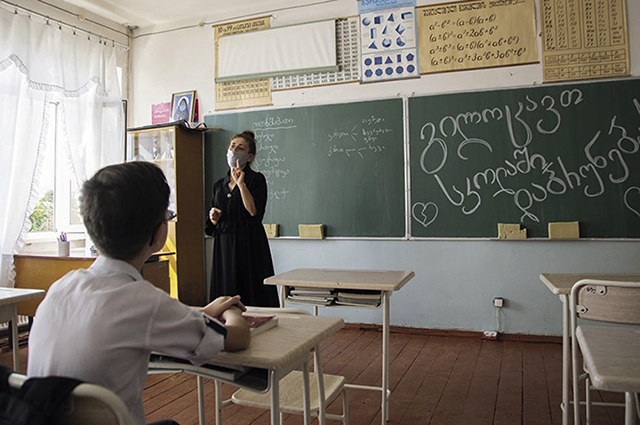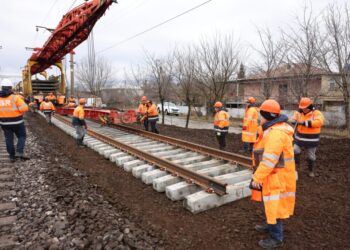The future of education seems to be at risk worldwide, and Georgia is no exception
In search of the best education, reference points may go totally awry if both the donors and recipients of education are not being careful. As a matter of fact, the future of education seems to be at risk worldwide, and Georgia is no exception in this precariously hypothetical perspective.
The main wrong probably starts in the field of school education, comprising the long years of primary, middle and high school learning. Of course, blaming Georgia’s schools for doing wrong might be an exaggeration, but it is also a fact that they are not doing a lot of right. In my profession, I annually encounter hundreds of children from various schools of Tbilisi, and I clearly see that only a handful of those angels display any brilliance- some are satisfactorily versed in the staples of enlightenment, true, but many fall under the category of mediocrity, and a considerable part of them just make a sad story.
The problem is that there are no shoulders on earth one can put the blame on for this dire system: kids don’t know what to do with themselves, parents send the poor little ones to school in hopes of having them returned full of knowledge, and teachers are not prepared to honestly take a hit. So who is supposed and expected to shore up this education system almost on the verge of crisis?
Well, how about the business side of our daily living? This could be a solution, right? Let’s give a try to daring thought! Let’s first look into the commonly accepted formula: to survive, one needs to make a living; to make a living, one must work; to work, one needs knowledge; to have knowledge, one needs the services of the education sector; to translate education into money, one has to have a sense of business. I don’t know how fair and practicable this formula is, but I know for sure that putting together those two – schooling and business – can truly save the day for us Georgians.
Americans talk quite extensively about the issue these days, because, surprising as it may be, they have the same problem, especially in inner city public schools. It is a contemporary public idea in the States that private sector involvement with public schools can trigger something good. Leadership training, business administration courses, adoption of a school program by able businesses, support of school restructuring, academic reforms, acquisition of updated equipment, refurbishing of school buildings, replacing of school inventory, awards for recognition of good teachers, citations for best students with a prospect of employment by those businesses, and so on: Business efforts could certainly be widened and deepened, thus making them more effective.

It is a contemporary idea in the US that private sector involvement with public schools can trigger something good
To quote one article on the topic, behind these new initiatives lie three separate problems that tend to run together when people talk about the education crisis in America: one is the social burden placed on schools by poverty, drug abuse, violence, and hopelessness; another set of problems is inflexible bureaucracies, inane regulations, and incompetent administrators; and the third one is educational, which is measured by America’s academic failures in general.
Looking now to our own fair land, and having made an attempt to identify the drawbacks of the Georgian educational system, I was taken aback when my list of shortcomings hit three-digit numbers. As such, I will put forward here just some of the weaknesses of the system: instability, meaning too many reforms, changes and alterations that keep teachers, students and parents in a state of perpetual confusion; no clarity about what to teach, how to teach and who should teach; inaccessibility of education for a considerable number of youth, proven by the lingering pandemic, expressed in the lack of computers, absence of internet and presence of social inequality; pecuniary shortcoming of state-issued vouchers worth only GEL 350 per annum per child; the professional incompetence of teachers and inadequacy of facilities for the enhancement of their qualification; ineffectiveness of PTAs, characterized by the massive indifference of teachers to working with parents and the nonchalance of parents towards cooperation with educators; unproductiveness of teacher-student interaction at both the academic and social levels; lack of motivation from the crème de la crème of the nation to participate in school activities; detrimental educational infrastructure, including premises, textbooks and contemporary inventory; no sense of the necessity of education easily translating into wellbeing; low recognition of the indispensability of knowledge of how to teach a subject; shortage of teacher labor remuneration; lack of connection between schooling and future employment opportunities; no autonomy for schools based on the refusal to decentralize; and finally, the pandemic of private tutoring making the whole education system of the country seem quite questionable.
To add to this bulky list of our education system’s imperfections, I would also mention the reading problem among our children, which stems from their abnormal infatuation with various gadgets. And while it should also be recognized that kids these days are often better informed on many issues than their teachers thanks to their access to internet, it is also true that the same kids often find it difficult to answer even elementary questions. A paradox, isn’t it?
I am not ready to tailor all the flaws and merits of the American educational system on ours, but I am prone to draw some notable parallels between us and them. And my choice of the best among these parallels would be the idea of marrying business and education in this country too. It’s one of many possible solutions, but if it works, let’s get to it!
Op-Ed by Nugzar B. Ruhadze














